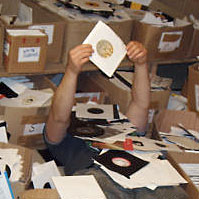Archive for the ‘Blue Note’ Category
Wednesday, January 1st, 2014
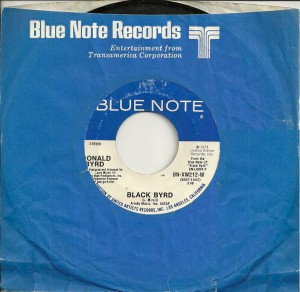
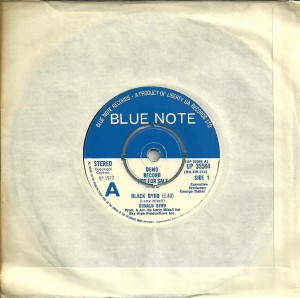
Listen: Black Byrd / Donald Byrd
Black
Apparently, purists howled with indignation when Donald Byrd released his BLACK BYRD album, a full-fledged foray into R&B that erupted into a popular phenomenon. He was branded a sellout and a traitor to his hard bop credentials, especially after it became the biggest selling album in Blue Note’s history. What the elitists missed, though, was that BLACK BYRD was the moment when his brand of fusion finally stepped out from under the shadow of his chief influence, Miles Davis, and found a distinctive voice of it’s own.
Never before had a jazz musician embraced the celebratory sound and style of contemporary funk as fully as Donald Byrd did here, not even Miles Davis, whose dark, chaotic jungle funk stood in sharp contrast to the bright, breezy, danceable music on BLACK BYRD. He gives free rein to producer/arranger/composer Larry Mizell, who crafts a series of tightly focused, melodic pieces often indebted to the lengthier orchestrations of Isaac Hayes and Curtis Mayfield. adding a funky sense of groove that’s near irresistible.
Hence Blue Note’s decision to edit the album’s title track into an abbreviated single, given the solos are mostly melodic and in the pocket, yet allow the funk to take center stage. Despite the fact that the electric piano, sound effects, and Roger Glenn’s ubiquitous flute date the music somewhat, it’s really part of the charm.
The album and single were state of the art for 1973, when Rich Fazekas at United Artists, who distributed Blue Note, sent me a copy. BLACK BYRD set a new standard for all future jazz/R&B/funk fusions, of which there were many.
Doanld Byrd would continue to redefine his sound on equally essential albums like STREET LADY and the fantastic PLACES AND SPACES, but BLACK BYRD stands as his groundbreaking signature statement.
Thank you Rich Fazekas, Aquarianrealm, Steve Huey and Donald Byrd.
Tags: Blue Note, Curtis Mayfield, Donald Byrd, Isaac Hayes, Larry Mizell, Miles Davis, Rich Fazekas, Steve Huey, United Artists
Posted in Blue Note, Curtis Mayfield, Donald Byrd, Isaac Hayes, Larry Mizell, Miles Davis, Rich Fazekas, Steve Huey | Comments Off
Sunday, October 6th, 2013
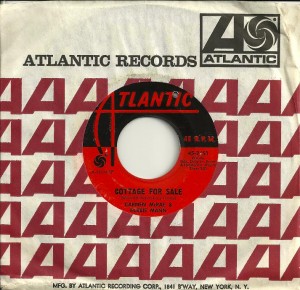
Listen: Cottage For Sale / Carmen McRae & Herbie Mann
Cottage
During the mid 90′s, I spent a ton of time in Seattle. We nearly bought a place there in fact. They were almost giving away 60′s houses back then. In one way, it might have been a great move. I could have bought even more records, and just left them in the new place. Because let me tell you, they were nearly giving away records then too.
Golden Oldies was the local chain that sold only used vinyl. There were like five stores in the greater Seattle area. And the main one, on NE 45th Street, was my shrine. I spent hours in the place.
Everything was beautifully organized, basically by genre. The jazz singles took the least time to scour. Not because of quantity. No, there were a ton. But they were all 50¢, tops. I bulked out a massive jazz singles library by default. Grabbed everything remotely interesting. Never left a Verve, Prestige, Atlantic or Blue Note single behind. And the jukebox worn copies, loved those too.
Combine that with a seemingly bitchy drug and alcohol abusing dame, doing lounge covers from the 50′s or 60′s, and I’m grabbing a copy. Not that Carmen McRae was necessarily any of those, but I can fantasize and did.
‘Cottage For Sale’, on Atlantic, black vinyl turning white from years in the jukebox of an old man’s bar for 50¢.
Sold.
Tags: Atlantic, Blue Note, Carmen McRae & Herbie Mann, Golden Oldies Seattle, Prestige, Verve
Posted in Atlantic, Blue Note, Carmen McRae & Herbie Mann, Golden Oldies Seattle, Prestige, Verve | Comments Off
Wednesday, February 29th, 2012
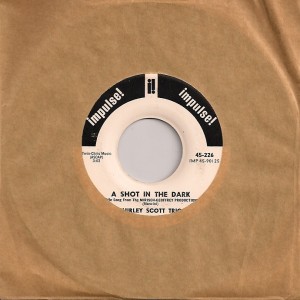
Listen: A Shot In The Dark / Shirley Scott Trio
A Shot In The Dark / Shirley Scott Trio
Why The Shirley Scott Trio didn’t do a James Bond theme escapes me. If ever there was proof of that potential, it’s on this remake of Henry Mancini’s ‘A Shot In The Dark’. Hints of blaxploitation are seeded within this Oliver Nelson arrangement / Bob Thiele production most likely by accident instead of design. From the absolute must have GREAT SCOTT album, the bombastic arrangements almost can’t be topped. Search it out, if only for the fantastic cover shot of Shirley during her classic blond hair dye job gone wrong period of ’64 – ’65.
Married to Stanley Turrentine during the 60′s, they shared recording contract obligations, releasing as many as ten albums between them on a yearly basis at one point. Another born again of the Jimmy Smith church, Shirley switched from piano and trumpet to a big Hammond B3 shortly after seeing him live in her home town of Philadelphia.
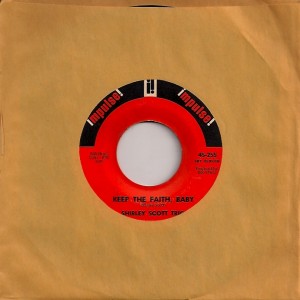
Listen: Keep The Faith, Baby / Shirley Scott Trio
Keep The Faith, Baby / Shirley Scott Trio
For my palate, ‘Keep The Faith, Baby’ is the ultimate peak of her vast body of recorded work, certainly the 7″ singles. Not only does it live up to the mod jazz tag often associated with her mid 60′s stuff, but it reminds me of how lucky I was to frequent Seattle in the early 90′s, when the town was bursting with used record stores.
There was a chain, privately owned, specializing in singles, all divided up by genre. I spent hours pawing through those bins. Everything, particularly jazz, was a steal. A good portion of my Shirley Scott singles, around twenty, came from those trips. It was very bizarre to me that nobody, including collectors, was interested in jazz 7′s. God, I drooled over them. Thick vinyl pressings on Impulse, Verve and Blue Note were too much to pass up. And I’m glad now that I didn’t.
‘Keep The Faith, Baby’ was recorded on January 13, 1967 at Capitol Studios in New York, again with Bob Thiele producing. It features the ultimate Shirley Scott Trio lineup with George Duvivier on bass and Mickey Roker, drums.
Tags: Blue Note, Bob Thiele, George Duvivier, Impulse, Jimmy Smith, Mickey Roker, Oliver Nelson, Prestige, Shirley Scott Trio, Stanley Turrentine, Verve
Posted in Blue Note, Bob Thiele, George Duvivier, Impulse, Jimmy Smith, Mickey Roker, Oliver Nelson, Prestige, Shirley Scott Trio, Stanley Turrentine, Verve | No Comments »
Friday, August 19th, 2011
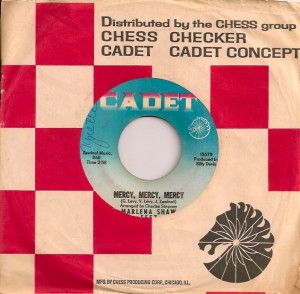
Listen: Mercy, Mercy, Mercy / Marlena Shaw
Mercy, Mercy, Mercy / Marlena Shaw
Like with Bobby Hebb’s ‘Sunny’, I also have a similar penchant for ‘Mercy, Mercy, Mercy’. Basically, never do I pass up a copy, in fact, the loungier the better.
There are plenty of renditions around by everyone from Jaco Pastorius to Nils Lofgren. Not to mention versions buried in jazzy muzak albums that came fast and furious in the late 60′s.
’67 was the year that saw the song hit Billboard’s Top 5 twice, The Buckinghams version with lyrics, and the original instrumental from The Cannonball Adderley Quintet which went to #1, no doubt a surprise to both artist and label. Big fan of both.
Those in the know, like England’s mods, would attest that the grooviest, hands down, is from Marlena Shaw. Here’s a lady that recorded for the who’s who of RnB/Jazz labels during her career: Chess subsidiary Cadet, Blue Note and Verve.
In ’63, after initially deciding to go for the big time, and get into a record company, she auditioned for, but was turned down by Columbia. Several years later, they changed their minds and signed her away from Blue Note after releasing the wonderfully titled WHO IS THIS BITCH, ANYWAY?
Sounds familiar. I got invited in to Columbia for an interview in the late 80′s, never heard another word from them. About ten years later, out of the blue they rang again, this time offering me a job. I figured, give it a try. Lasted twelve years.
Tags: Blue Note, Cadet, Cannonball Adderley, Chess, Jaco Pastorius, Marlena Shaw, Nils Lofgren, The Buckinghams, The Cannonball Adderley Quintet, Verve
Posted in Blue Note, Bobby Hebb, Cadet, Cannonball Adderley, Chess, Jaco Pastorius, Marlena Shaw, Nils Lofgren, The Buckinghams, The Cannonball Adderley Quintet, Verve | Comments Off
Saturday, December 25th, 2010
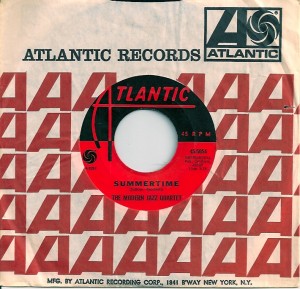
Listen: Summertime / The Modern Jazz Quartet MJQSummertime.mp3
The Modern Jazz Quartet’s run with Atlantic Records was a superior one, every new album as superb as the last. Their vibes/piano/bass/drums template perfectly proceeded to calm my nerves. When it comes to jazz, gentle and sparse wins over harsh and busy any day of the week.
In the early 90′s, many a company trip to Seattle became my norm. Corinne and I loved it there, and near moved into one of the endless 50′s ranch houses seemingly round every corner. The junking was superb and the vinyl shops were as close as you can come to dying and going to heaven in the US.
It’s where my fetish for jazz 7″s began. There was a chain of used vinyl only stores, all sectioned within by genre. Nobody seemed even slightly interested in the jazz singles. Albums yes, singles no. If virtually no competition wasn’t enough, the $1 price tag was the straw. Basically anything on Verve, Blue Note, Prestige and Atlantic were no brainers. In only a few visits, my jazz collection went from zilch to very complete. Plus they fed the jukebox perfectly.
‘Summertime’ looked radiant sitting there in The Modern Jazz Quartet’s bin. Shiny Atlantic label (on plastic as opposed to vinyl) + original stock sleeve + unplayed pressing + can’t-lose song delivered via their signature approach + $1 price tag = jackpot.
When I finally got home, ‘Summertime’ went directly onto the Seeburg. It still resides there today, having weathered, I would guess, hundreds of spins hence it’s lovingly played condition. Their version turned out to be better than I could ever have expected.
Tags: Atlantic, Blue Note, Jukebox, Prestige, Seeburg, The Modern Jazz Quartet, Verve
Posted in Atlantic, Blue Note, Jukebox, Prestige, Seeburg, The Modern Jazz Quartet, Verve | Comments Off
Thursday, December 16th, 2010
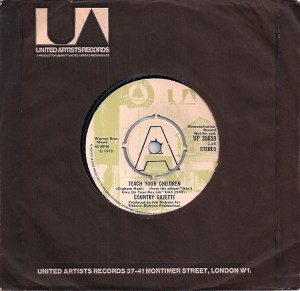
Listen: Teach Your Children / Country Gazette CountryGazetteTeachYourChildren.mp3
Graham Nash seems a good egg. Having written so many great songs, his patience with Crosby, Stills & Nash must be admired. Unlike The Hollies or he as a solo artist, that band just never seemed to breathe life into any of his compositions. I didn’t pay them a lot of attention mind you, and only when it was a Graham Nash song did Crosby, Stills & Nash seem to catch my ear.
How glad was I to finally find an inspired version of ‘Teach Your Children’ in a pile of A labels, saved so generously for me by my pal Graham Stapleton in London. Check out our history elsewhere on the blog.
Even before giving it a spin, hopes were high. Jim Dickson had produced. His many recordings with The Byrds, he demoed and managed their original lineup, were always powerful.
When Country Gazette were current, and releasing records on United Artists, yours truly was the label’s New York State college rep, having gained notice from Rich Fazekas. Basically UA, as we all called them, were the US outlet for a few of my top favorites from the period: Roy Wood via his various releases with The Move, Wizzard and solo; plus Family. Racing their singles and albums to the top of our college station’s playlist alerted the UA home office. Fandom expanded to business relationship. Exactly what going to college is really all about, making connections for the real world.
Once firmly in place as the UA college rep with a trunk full of promos, I blindly championed the aforementioned English acts, while unfair lack of attention was bestowed on the Blue Note catalog and various Nashville leaning artists like Townes Van Zandt and Country Gazette. Big regret. Apologies.
Luckily, the ‘unable to throw anything away’ gene meant I saved a copy of every last record I was supposed to promote, and can now repent for my sins by finally trying to spread the word about Country Gazette, even if Graham Stapleton hadn’t saved me this 7″.
Tags: Blue Note, Country Gazette, Crosby Stills & Nash, Family, Graham Nash, Graham Stapleton, Jim Dickson, Rich Fazekas, Roy Wood, The Hollies, The Move, Townes Van Zandt, United Artists, Wizzard
Posted in Blue Note, Country Gazette, Crosby Stills & Nash, Family, Graham Nash, Graham Stapleton, Jim Dickson, Rich Fazekas, Roy Wood, The Hollies, The Move, Townes Van Zandt, United Artists, Wizzard | Comments Off
Saturday, March 13th, 2010
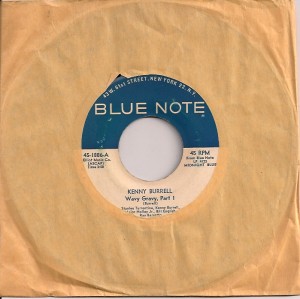
Listen: Wavy Gravy (Part 1) / Kenny Burrell KennyBurrellWavy1.mp3
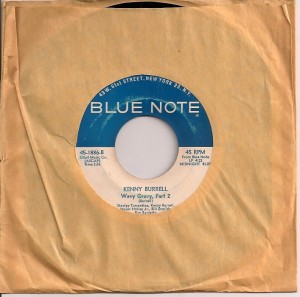
Listen: Wavy Gravy (Part 2) / Kenny Burrell KennyBurrellWavy2.mp3
When I was a kid, we went to see Chet Atkins play the State Fair. I couldn’t believe I was being dragged to this horribly unhip show, why weren’t some British Invasion bands booked instead?
April ’69, Humble Pie played that very stage on their first US tour: Steve Marriott and Peter Frampton. Seemed like an eternity, but it was only three or four years later that those former members of The Small Faces and The Herd stood where I had suffered through Chet Atkins.
Now in hindsight, I wish I’d have paid more attention. And to be honest, it did leave a lasting impression. I can still hear his clean, electric hollow body technique. It’s what connected me to jazz guitarists.
I never bought the albums, not ever. But I sure did look at them in the shops. The Blue Note sleeves in particular were pretty stunning. Once the 70′s and my college radio years began, suddenly all those jazz albums became accessible: Wes Montgomery and Kenny Burrell.
Give me a clean, fast jazz player any day of the week. The horns and brass, I can’t take it, but guitarists, never get tired of them.
Tags: Blue Note, Chet Atkins, Kenny Burrell, Peter Frampton, Ray Barretto, Stanley Turrentine, Steve Marriott, The Herd, The Small Faces, Wes Montgomery
Posted in Blue Note, Chet Atkins, Kenny Burrell, Peter Frampton, Ray Barretto, Stanley Turrentine, Steve Marriott, The Herd, The Small Faces, Wes Montgomery | No Comments »
Thursday, February 18th, 2010
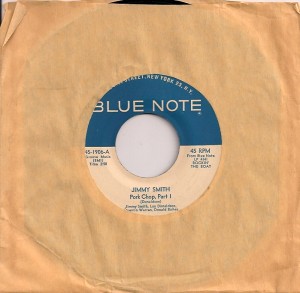
Listen: Pork Chop (Part 1) / Jimmy Smith JimmySmithPorkChop.mp3
It is just not possible to walk away from any Blue Note single titled ‘Pork Chop’. Doesn’t matter who it’s by.
Jimmy Smith, credited for having revolutionized the way Hammond B3′s could be played, set the bar for an early 60′s Mod style that was as much a part of that scene as bulls eye jackets. When attacking it wild, he’s sometimes hard to tell apart from Brian Auger or closely named Jimmy McGriff, but a bunch of his singles play ever so smooth, especially on my Seeburg 222, like ‘Pork Chop’. Want to go straight back and pretend you’re at The Flamingo, or a 60′s dive in Harlem very late – just combine a jukebox with this single – and you are there.
Tags: Blue Note, Brian Auger, Flamingo, Jimmy McGriff, Jimmy Smith, Seeburg
Posted in Blue Note, Brian Auger, Flamingo, Jimmy McGriff, Jimmy Smith, Seeburg | No Comments »
Sunday, April 19th, 2009
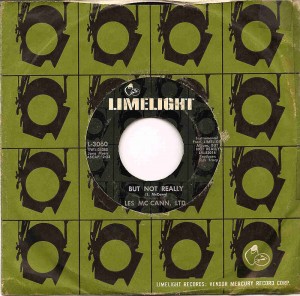
Listen: But Not Really / Les Mc Cann, Ltd. LesMcCannButNotReally.mp3
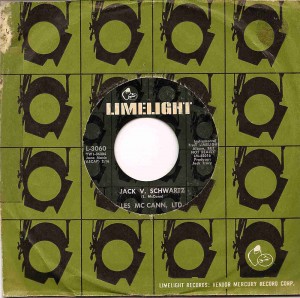
Listen: Jack V. Schwartz / Les Mc Cann, Ltd. LesMcCannJack.mp3
Fill a 1958 Seeburg 222 with mid 60′s jazz singles and you can literally transport yourself back in time. To a jazz affectionado, this might be sacrilegious. Most jazz fans double as audiophiles, collecting deep groove Blue Note pressings at premium prices. This is great news actually. They’ve all ignored the disposable 7″ format for that genre, thereby making the acquisition of thousands of jazz singles a very easy accomplishment, and usually never at a price above a dollar or two. Thus it has been an ongoing process for me during the past twenty years. I love ‘em all, especially the small combo, brass free ones. Actually, I hate brass, but still happily own many Miles Davis, John Coltrane, etc. etc. 7′s nonetheless.
Les Mc Cann released loads of jukebox friendly singles. I particularly love his, well any, releases on Mercury’s jazz imprint Limelight. A mid 60′s subsidiary, the label and sleeve design perfectly captured the feel and color of the era, with real verve (no pun intended).
Posted in Blue Note, John Coltrane, Les Mc Cann, Limelight, Mercury, Miles Davis, Seeburg, Verve | No Comments »
Sunday, March 8th, 2009
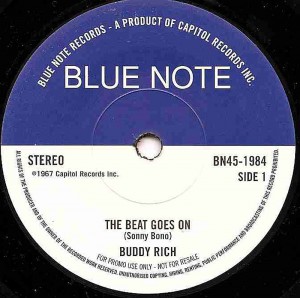
Listen: The Beat Goes On / Buddy Rich BuddyRichBeatGoesOn.mp3
Cathy Rich, Buddy’s then teenage daughter provided vocals for his 1967 remake of the Sonny & Cher hit. A highly sought after acid jazz, hipster, trust fund, bohemian lifestyle staple. So if you’re in the mood for such a listen – here you go.
Posted in Blue Note, Buddy Rich | No Comments »
Monday, July 7th, 2008

Listen: Black Byrd / Donald Byrd DonaldByrdBlackByrd.mp3
If I am musically all over the place with these posts, it’s because I like everything. Pretty much all kinds except…modern country or classical, and even then I admit not appreciating those genres and therefore, don’t listen enough to truly know. But I can easily have a foot in both RnB and 60′s UK rock at any given moment (or on the two turntables waiting to do a segue as I amuse myself playing deejay). So, Donald Byrd. I love the Blue Note label for one, it’s 7″ designs were really appealing to me. Not big on brassy jazz, there are always exceptions. Donald Byrd is one, and because this promo copy makes me shake at the knees, an extra break is cut. Plus ‘Black Byrd’ is such a period piece. It’s his only charting single – and one that could probably never be a hit nowadays. At the time, it was just the urban/jazz/funk sound of the street. Today it’s associated with the films of that moment, conveniently coining them and the music as blaxploitation. BLACK CEASAR, FOXY BROWN, SUPERFLY, SLAUGHTER’S BIG RIPOFF etc – I can watch them endlessly. The cars and clothes and shots of a very changed Harlem keep my eyes peeled. ‘Black Byrd’ could have placed perfectly in any. Edited down from the lengthy album version, I was working for a one-stop record distributor upon it’s release and they both sold like hot cakes. Now, it’s getting really difficult finding a clean copy of the single or album for that matter.
Posted in Blaxploitation, Blue Note, Donald Byrd | No Comments »














